#like there is no need to go into like. the economics of it. which is what im doing for some fucking reason
Note
Do you have any recommendations for gaining access to these books? I have a pretty long list of ones I want to read but can't afford most of them. The library has the big ones (Whipping Girl, Detransition Baby, Nevada) but the newer or less well known ones have been difficult to find
No this is actually so real though. Let's talk about it.
One of the big problems that I'm trying to address here is the fact that there is a lack of ability for trans books to reach their perhaps core audience, trans people. Over the last few years trans librarians have been trying to increase the number of trans books in circulation, but that's super contingent on where you live. Not to mention the fact that, at least in the US, states are actively trying to criminalize circulating trans books in libraries.
I know Tumblr is allergic to economics a lot of the time, but you've gotta look at the math to understand why this is the current state of things. Essentially it's a vicious cycle. Lots of trans people can't afford to buy a $25 hardcover on a whim, and traditional publishers put a lot of stock into how well a book performs on release, cause that's how they make money. So when the core audience can't afford it and isn't marketable, they register that as a lower demand, which means that fewer trans books get published, fewer end up in libraries, and the cost of an individual book is driven higher. Low demand, high price. Then because the price is high, trans people cant afford the books, and the cycle continues.
It is the dilemma of the transfemme author that most of their core audience is also gonna be transfemme. It's a self-selecting process that's very hard to break out of. And at the end of the day, there just isn't very much money to go around in the trans community because trans people so frequently get cut off from generational wealth. So when you get an ecosystem of transfemmes selling books to other transfemmes who also sell books to them....
I took a class on the Sociology of Art a few years ago, and one of my core takeaways was that the boundaries of a field (yes my teacher liked Bourdieu, come for her ass, not mine) are fundamentally governed by institutions and entities with the money and power to dictate their rules of play. In Althusser's language, you would call those ISAs (Ideological State Apparatuses). When you read Weber, he talks about how culture needs to have some level of social legitimation in order to become a force of power in the world (I butchered that but it's the gist lol). And it's like.
The people who have the money to read the books dictate which books receive the money. Organizations like Lambda Literary, presses, big name publishers, etc. One of the big problems in the field of trans literature up to this point is that the only people who've had the money to produce social legitimation from the organizing schema/matrix of an ISA have also only chosen to read a very small slice of the extant literature. Then, because those non-profits and presses and companies only champion a small selection of books, that in turn dictates for those who have less money which of those books deserve social attention, critical acclaim, sales, library slots, etc.
And like, all of that is an illusion, but it produces a material reality for the transfemme author. It dictates the material conditions for the reproduction of said literature and who can participate in it.
So, what's to be done about it?
"Buzz" is a big deal in the publishing industry. A good review, an award, a thinkpiece - all of that can be the difference between a successful book and a flop. Publishers look for that. If nobody talks about a book and it doesn't sell well, they'll drop the author faster than you can say Susan. Again, vicious cycle. But like, at the end of the day, a "field," an "ISA," a "legitimated" work of art, that's all just a class prerogative. The different between a Very Important Literary Blog and a "person talking about books on the internet" is money. Like. It's just money. The reality of it is really banal.
It's who has the money to read books. It's who has the money and time to write about books. It's who has the money to gain institutional access to book. It's who has the money to read enough to say, "Oh, well that might seem true, but if you look at X, Y, and Z it's clearly not." It takes money to fact check. It takes money to challenge institutional myths. It takes money because when an institution makes a claim about a book and none of the people who care enough to argue with them have the cash to challenge it, the claim tends to stand.
And like, the honest truth is that between the books, the website, and the education, I've spent a lot of money bringing this website online in the form you're reading it in. A lot of the books I've read were really fucking expensive. I grew up in a wealthy family, my parents were accepting. They have both the means and the desire to support my passion projects. I'm lucky.
The goal of The Transfeminine Review is to create at least one independently trans-run website that can challenge that brand of institutional legitimation work from non-profits and big publishers and cis outlets, a website that can actually highlight transfeminine literature as it exists in the world, not as the Big 5 publishers have dictated it. Topside, Metonymy, Arsenal Pulp, LittlePuss, etc. They've all taken on that challenge from the angle of producing books, but there hasn't been a corollary trans secondary ecosystem dedicated to documenting and critiquing them. Or there is, but it's extremely diffuse and hard to find if you don't know exactly what you're looking for. Then there are the general queer outlets, like them. and whatnot, and they do their best but literature is a side hustle at best. There's the queer-helmed literary outlets like Electric Lit (shout out Denne Michele Norris) but they spend most of their time talking about cis authors. None of it is designed to help or review self-published literature from poor authors, and let's be frank, most transfeminine publishing is still done indie or self.
It's an investment, essentially. On the longshot, the hope is that this website will inspire others to do similar work, and that eventually through the collective efforts of trans authors and their readership, we can begin to change the math on trans publishing and help to spread it to a wider audience.
Now.
None of this changes the current reality that trans lit is expensive.
Unless you're lucky, you're probably not gonna find much trans lit at the local library even if you dig for it. Another good place to find free trans books is transreads.org, but their selection is mostly non-fiction, and the fiction is, again, largely the same few books you can find elsewhere. Another good online queer library is https://www.queerliberationlibrary.org/, which might be a good place to look (shoutout to Skye for bringing it to my attention!)
There are a couple of cheaper places to find trans books. If you shop around on itch.io, a lot of self-published trans authors have "name your price" models, which can be more accessible. Creators on itch will also bundle their work on a fairly regular basis, so you can get like 10-20 books for $10, which is, by my token, an excellent price.
If there's a particular author you're interested in, a lot of self-pub trans authors have Patreon accounts where they serialize their novels. You also can find serial (pre-edit) versions of a bunch of books on Scribblehub.
This has gotten steadily less affordable over the last few years cause Amazon is evil, but Kindle Unlimited ($11.99 a month, but there's a free trial) has thousands of trans books. Most of them are erotica, but like, there are a lot of hidden gems in there, and if you're a voracious enough reader, then it'll definitely be much cheaper per book than buying trad.
The problem with all of these, though, is that they tend to favor specific genres and tropes. Like there's only so much variety on itch.io or Scribblehub or transreads.org or KU. So if you like the genre conventions, then awesome! But if you don't it's probably not for you.
And none of it will give you access to some of the rare older tradpub books or the new but scarce releases that I've been going through unless you're willing to pay the full price for them.
I wish I had a better answer, but that's unfortunately the current state of the industry :/
Hopefully this ramble is helpful.
Beth
#trans fiction#trans literature#transfem#booklr#books#literature#literary criticism#transfeminism#publishing#self publishing#publishing industry#sociology#economics#basically the publishing industry is fucked and transfemmes get an especially short end of the stick
444 notes
·
View notes
Text
Before: Gonna Drain The Swamp
Now: Tariffs Will Make China Pay Taxes
Donald Trump’s tariff proposal is worse than even his critics say. Much worse. Trump keeps telling audiences that he’s going to make China and other countries pay taxes to the American government. As even right-wing economists are acknowledging, that’s utter nonsense—as fanciful as his claims that he would make Mexico pay for a wall on our southern border.
A tariff is, in effect, the equivalent of a national sales tax on imported goods, as any economics professor will tell you. Think of it: If we impose a 10 percent tariff on a dishwasher made in China, the manufacturer or importer just raises the U.S. price by 10 percent.
But it’s much worse than that because of how domestic manufacturers will react should the Trump national sales tax tariff be imposed. The Trump tariff will make people who own domestic manufacturing companies rich beyond their greediest dreams, aggressively redistributing wealth and income upward in the United States.
How would the Trump tariff do this? Imagine for a moment that you own a company that makes cars. And let’s assume, to keep the math simple, that each vehicle coming out of your factories sells for $10,000, of which $1,000, or 10 percent, is your profit.
Chinese carmakers sell their cars in the U.S. for the same price.
Trump then imposes his tariff. He doesn’t need to ask Congress to do this. Lawmakers have already granted presidents broad authority to impose tariffs. Trump says he will slap a 60 percent tariff on imported goods from China.
The dealers who sell Chinese cars in America will have to raise their prices to $16,000. If you buy a Chinese car, you will pay that tariff, not China. Indeed, the only harm to China would be selling fewer cars because the tariff would make Chinese cars too costly for many Americans.
But remember, you own an American car company. Will you continue selling your cars for $10,000 to earn a $1,000 profit per vehicle? Not a chance. A fundamental economic theory is that capitalists seek to maximize profit. Every business and finance school teaches this bedrock principle: profit maximization.
Trump’s tariff means you can raise the price of your vehicles to $16,000 and not lose any market share. However, the Trump tariff doesn’t apply to you since you are a domestic carmaker. That means you will collect not $1,000 profit per car but $7,000, all paid by your customers.
But because profit maximization is your goal, you will likely undercut the Chinese car companies. To simplify the math, you would charge $15,000 for each car. That’s a large enough discount that some people who want a Chinese car will purchase your American-made car instead.
That $1,000 profit you made on each car will skyrocket to $6,000. That extra profit comes at no cost. You won’t have to hire more autoworkers, engineers, and salespeople, or spend money on enlarging your factories, or add alluring bells and whistles to your vehicles. Thanks to Trump, you will pocket six times as much profit per car. Sweet.
You can see why people who care only about money and have no social conscience would be eager to support Trump’s campaign and donate millions of dollars. Even if car sales fall by half, they will pocket more money than today.
Trump’s tariffs stand to make you so much money that you’d be laughing not just on your way to the bank but on your way to your megayacht, private jumbo jet, private Caribbean islands, and your many mansions.
Businesses in America typically earn profit margins of between 5 percent to 15 percent of revenue. Companies with little competition typically collect larger profits.
Digital companies often earn vastly higher profits because they have almost no labor costs. That’s because they get you, the customer, and software to do the work. We don’t call this a slave labor economy because the digital companies don’t own you. But they own a piece of your time, and, like Tom Sawyer getting other kids to whitewash the fence, they get you to do their work for zero compensation.
At $15,000 a vehicle, thanks to Trump, as the owner of a car company, you will pocket 40 percent of the sales price as profit.
The Trump tariff would definitely reduce the volume of cars sold. Many people won’t be able to afford cars that cost 50 percent or 60 percent more than today. Therefore, they’ll keep their cars longer. Trump’s national sales tax will benefit auto mechanics as people spend money to extend the life of their cars. Since you own a car company, this will bring you a different stream of profits—from the spare parts you sell to mechanics to repair and maintain the cars you sold in the past.
So the net effect of Trump’s tariffs would be to raise the price of goods made in China as well as goods made here in America.
Whether buying single-use wooden utensils for a backyard barbecue, computers for your children to do schoolwork, or new shoes, you will pay much more to buy Chinese or American-made goods.
Now, if you think America’s problem is that the rich don’t have nearly enough—well, please vote for Donald Trump, because he has an effective solution for that problem. Just don’t complain later that you didn’t understand that the reason you are driving an old beater and forgoing vacations with your kids to make payments on your new superpriced domestic car and other goods is that you didn’t know that Trump had a plan to stealthily siphon money from your pocket so the already superrich could be even richer.
#2024 us presidential election#vote#vote harris#vote democrat#vote blue#kamala harris#harris 2024#kamala 2024#vote kamala harris#kamala harris 2024#harris walz 2024#harris for president#kamala harris for president#tim walz#women's rights#women's healthcare#abortion#right to choose#union strong#2024 election#project 2025#Healthcare For All#save democracy#razor roy#razor roy matthews#roy matthews#trump#donald trump#We're Not Going Back#Walz
52 notes
·
View notes
Text
what if kobeni had a contract with famine?
1. she's the first one to mention starving in the infinity devil trap.
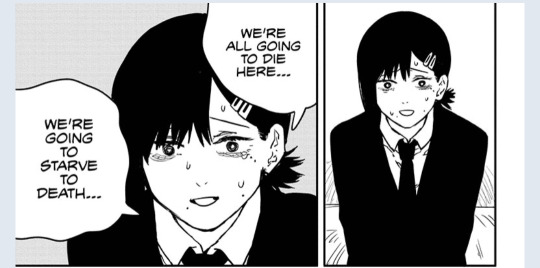
2. you could hide some foreshadowing under innocuous comments that anyone could make. it's not odd for a poor 20 year old girl to take comfort and enjoyment in tasty food. mentioning the hobby right after 'my devil is a secret' could be nothing, but....

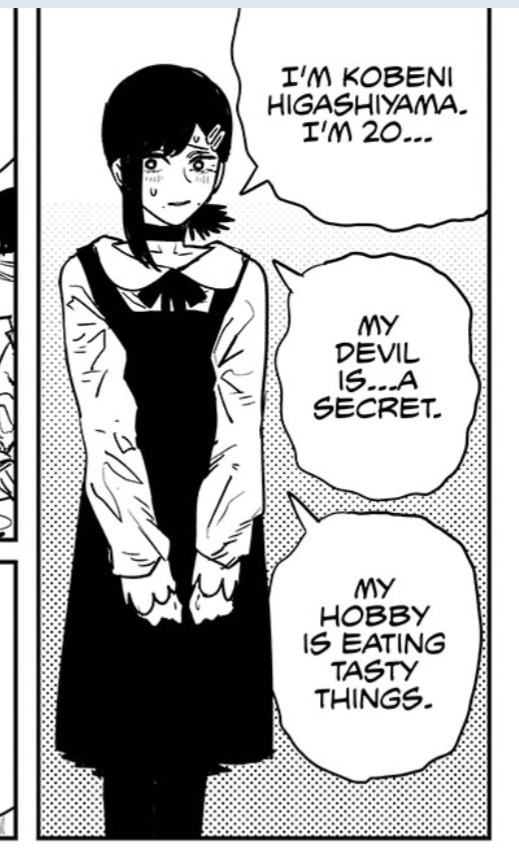
3. someone on reddit mentioned a possible 'final girl' devil with kobeni which I love but I felt the kitchen knife mention would match better with famine. after all, we see falling devil act as a chef preparing a meal for famine. could expand that to kobeni.
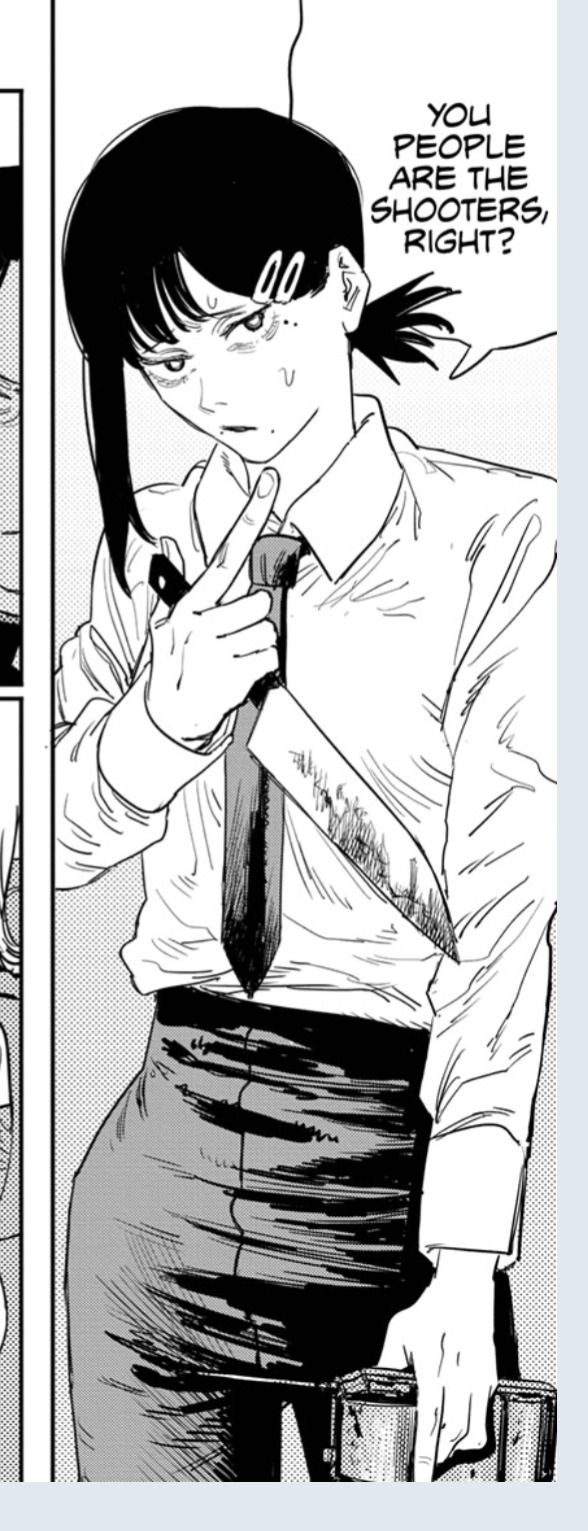

4. after famine reveals her name at the aquarium, a kobeni bro makes his debut. also if the infinity devil was used by famine here, was it also used by famine the first time we see it?
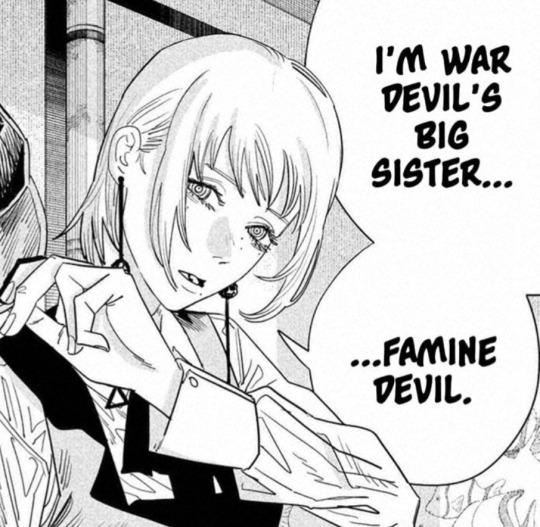

5. what we know of famines motivations and context as a horseman translates well to a theory on kobenis abilities. they seem quite powerful when activated so you would need a powerful demon.
5a. ok so my theory. when kobeni is starved of enough good things (family, luck, companionship, safety, bravery, etc), to the point she is fully starved from her humanity, she becomes hyper competent.
you see her fail to reach this state in the hotel due to her clinging to humanity (feels bad about wanting denji dead, for stabbing aki, etc). I think she succeeds in reaching hypercompetence during the rhythm game bit due to being terrified and isolated, it just so happens that the hypercompetence went into playing the rhythm game.
the only other moment where kobenis devil contract ability(ies?) come into play is after her partner gets killed protecting her and she finds out her whole team has been wiped out.


5b. ok so how does this hyper competence after 'starvation' relate to famine as a devil? well the horsemen act as as symbols and metaphors for humanity/life to triumph over.
we see that supported by both conquest and famine taking the role of nurturing humans to become stronger. you could even make that claim for all devils but this isn't about that.
starving is supposed to trigger humanity's instinct to survive by Doing Whatever It Takes. this fits nicely to how I think kobenis contract functions and why she would accept a nerf on her life like that (and how it plays into mental health, childhood abuse, and how someone could choose permanent(?) self destruction at such a young point of their life).
the fact that we see her devil contract trigger (rhythm game) after she's already left public safety means she's stuck with that contract probably the rest of her life. she wanted to go to college but her neglectful parents forced her to pick between sex work and the equivalent of demon fodder.
and because we don't know anything about her contract, we don't know how much she gave up to have this power 😭 being starved of good luck sounds like a really bad longterm debuff even if you theoretically get really good luck at your most terrified moments.
i lost my train of thought here but I'll add one more tangential thing. fujimoto is showing multiple examples of what childhood abuse and/or lack of a stable life can do to someone and how those systems help, hurt, and trap them. kobeni is an example of something more grounded despite her being comedic relief and I love that contrast with her.
she was forced to join the military due to family pressure and economic situation, could not handle the mental strain and quit with a potential life long disability that could get worse over time. she gets a job at a fast food restaurant and has spent her life so far hopping from one toxic 'family' to another.
anyways. throwing kobeni famine contract into the theory pile
35 notes
·
View notes
Text
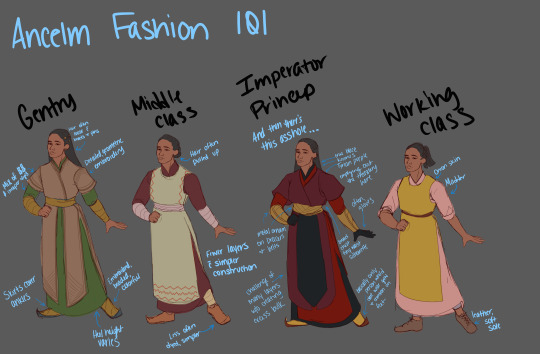
so it turns out i have more thoughts on fashion in TCP than anticipated (...surprise) and this is really only a small glimpse into norms in one city orz
#my art#story: tcp#but curio! you may ask. what about when they are riding horses! ancelm (as influenced by the rule of the soko family)#is rlly big on their Nomadic Horseback History!#to which i say. yeah that was literally one of the things i sat down to draw and then i read so much about natural dyes instead#also i haven't quite determined how the 'thou shalt not show a glimpse of ankle [THE HORROR]' vibes go with riding robes#which traditionally#i've drawn as knee-length orz#they might still be knee-length tbh or like. capri length#also in thinking about the pendulum of fashion#i think tcp takes place in a relatively conservative era in part bc arradine has not been having the best of all economic experiences#which i think. i need to actually build out more#and have neighboring states more opportunistic abt yknow#baby callebero on throne#anyway!!#i need to go to bed#and also maybe put ice on the toe that got smashed by my whiteboard falling off the wall in the middle of this
5 notes
·
View notes
Note
also i don't know basically anything about roman history so i don't understand the context (often) but i love your comics and style sooo much i want to learn so i can understand..
I'm glad that my comics can still be fun for you even without the context!! 💗
#HEUSHGHH so sorry to everyone whose messages have been in my inbox. i am slowly working through them all this weekend#or at least. i will do my best to work through them this weekend. it's 4am! im Dying™ and will be going to bed soon#also 10/10 i'd recommend perusing roman history even on a surface level for the sheer spectacle of it all#like there is no need to go into like. the economics of it. which is what im doing for some fucking reason#but thematically? rome is giving a lot and people have written many texts that are imho extremely fun reads#there's one about rome as a body (politically and literally) that is SO gorey and delightful im eating it like a feast#if there's a theme in lit/hist. you like there's a very good chance rome has something to offer! (with a side of Violence)#ask tag
26 notes
·
View notes
Text
i still can't believe she said that shit to me
#wordstag#she KNOWS I can't get behind that stuff ! She's met me yeah ?#tthen she has the audacity to say it's not that deep. Like yeah; saying that all of humanity is inherently evil and wouldn't#accomplish anything if it weren't for their lives hanging over their heads isn't that deep. Average Tuesday type conversation.#'if you were an apple farmer wouldn't you want to hoard your apples?' BUT FOR WHAT?? WHERE DOES THAT GREED GET YOU. WHY IS THE AVERAGE#PERSON IN YOUR MIND INHERENTLY GREEDY. Like ohhh if everything was free nothing would get done because people need motivation#like shit isn't getting done as it is now. You want to be a music teacher. You can't because of money. Why isn't this an obvious solution#like . I know you can't just go welp everything is free now; have fun. I know you can't destroy all of modern economics like that.#but why is a hypothetical magical world where we do that bad. What did the human race do before capitalism? Just roll over and die?#there was still art. There's always art. There's always going to be someone who wants to do something with their life that can't#because of MONEY. Like everything is so focused on money [coughing at the art industry] why can't it just be .#^^^^ anyway context I was talking 2 someone (that I know . Like really well ) and proposed just#getting rid of money forever . Because fhey wanted to be a teacher but couldn't bc money#and this was like . The most preposterous thing to them. Why would people do anything if not for money etcetc#even went as far as 'humans are inherently evil' which wooooaaaaah slow down there buddy .#you're letting your christian show. Or whateevr. Idk just not an idea I can personally get behind#then she goes 'it'snotbthat deep' like she didn't just imply something about the entirety of the human population. Or something.#like if humans are so evil jsut kill us now or something .
3 notes
·
View notes
Text
keep saying i don't want 2 work another retail xmas but canNOT 4 the life of me make myself finish my goddamn fucking job applications !!!!!! death & dying & despair etc. etc.
#i dont dislike the application process for gc jobs on principle BUT#it does not mesh well w/ my difficulties re: starting & finishing tasks#but like i understand why u cant just send in a resume n hit done#NOT that there are many IT listings up atm...... and ill apply 4 clerical/admin stuff too#but an IT-1 STARTS a good $10k a year higher than a CR-5 soooooo :///#which is whatever its fine money isnt everything!! ill gladly make less if it means not hating my job!!!#but i also wanna. u know. LIVE. move out of my parents house. buy brand name snacks occasionally. maybe -gasp- go on a vacation#(not 2 say i dont make an attempt at travel now but thats with very finite savings that are def only going down not up)#also extremely frustrating 2 me the emphasis put on having a degree that completely locks me out of certain job categories#like. yes. there are for sure some where having the bg knowledge is important eg. an AU (auditor/accountant) or MA (methodologist)#and there are certain skills a degree (in theory) provides eg critical thinking research etc.#but not all of us have $40k+ to get tge fancy piece of paper saying we have those things. and u can have those skills w/o a degree#and smth like an EC which needs a degree in economics sociology or statistics is so arbitrary#and maybe not necessarily actually based in the majority of work done by the majority of positions in that category#ANYWAYS not me being bitter abt education standards YET AGAIN lol#idek if i could go to uni even if i could afford it. even tho i have 2 college diplomas id probably have 2 redo my grade 12 english 😶🌫️#also if money were no object id probably go for like. film studies or smth lol not sociology#tho. ngl. if i had the willpower and determination 4 smth so rigorous (i 100% dont) accounting does seem. interesting asdffhkkfdghh#ANYWAYS pt. 2 all this 2 say this is why i instead spent $10k+ on the only possible 2 yr diploma#that can still get u in2 the higher paying public service jobs. even tho ive discovered i Dont Particularly Care for programming. :(#thats an understatement actually i was actively in hell for like 80% of that program and the remaining 20% mostly wasnt coding
3 notes
·
View notes
Text
I'm about to be so tired ghejeje
#os already tored fot rh same reaspns#been tring to microdose sleep forna bit moght just have to dp yh tadks mow#not honna edit yis. yall get yo dee the raw footage tnight#ok alarm done im up for real now 🤞🤞🤞#also i did not allow enough time actually lol#please let me qork let me work let me WORK#thats all i need baby just be a working good body/brain for a few more hours so i can get this shit in please and thank you#oughh..ok#ok im done with 2/3 of the things.. just gotta do number 3 okay you got this baby go fuckinf batshit go wild do that homework cockslayer#ouuu ra ra ra#sorry don't mind me I'm tryna hype myself up#the first paper was shocking easy but now i gotta figure out another idea#girl i got TWO ap tests on wednesday... i can't study OR sleep for them bc of this shit. ik it's my fault but what the helllll#ive never done 2 in one day before so im a Little Worried BUT at least one of them's lit analysis which is like. my niche#at least it is in a way economics n government n shit Arent Quite
3 notes
·
View notes
Text
pee ree id!
#i’m looking for a new job#which means not smoking the one antidepressant that WORKS#and as a replacement i’ve been drinking like crazy. like to the extent that i’ve developed a severe eye twitch#anyways on a similar note. my pop socket drives me nuts and i just ripped it off in a fit of alcoholic rage#so i will need to buy another tomorrow#if this is remotely legible that’s crazy anyways i wish weed was legal in texas and i wish it wasn’t on standard drug tests#because i fucking hate alcohol#and its side effects and when this is over i’m buying a fucking brick of cannabis and a 6’ bong and never touching alcohol for 6 months#i am going to change the stock price of weed when i can smoke again. i’m gonna shift the economic value of it. i’m gonna make my plug rich#I HATE ALCOHOL. I HATE THAT ITS LEGAL AND WEED ISNT. I HATE EVERYBTIGN
0 notes
Text
While I'm writing things that I've been intending to write for a while... one of the things that I think that a lot of people who haven't been involved in like... banking or corporate shenaniganry miss about why our economy is its current flavor of total fuckery is the concept of "fiduciary duty to shareholders."
"Why does every corporation pursue endless growth?" Fiduciary duty to shareholders.
"Why do corporations treat workers the way they do?" Fiduciary duty to shareholders.
"Why do corporations make such bass-ackwards decisions about what's 'good for' the company?" Fiduciary duty to shareholders.
The legal purpose of a corporation with shareholders -- its only true purpose -- is the generation of revenue/returns for shareholders. Period. That's it. Anything else it does is secondary to that. Sustainability of business, treatment of workers, sustainability and quality of product, those things are functionally and legally second to generating revenue for shareholders. Again, period, end of story. There is no other function of a corporation, and all of its extensive legal privileges exist to allow it to do that.
"But Spider," you might say, "that sounds like corporations only exist in current business in order to extract as much money and value as possible from the people actually doing the work and transfer it up to the people who aren't actually doing the work!"
Yes. You are correct. Thank you for coming with me to that realization. You are incredibly smart and also attractive.
You might also say, "but Spider, is this a legal obligation? Could those running a company be held legally responsible for failing their obligations if they prioritize sustainability or quality of product or care of workers above returns for shareholders?"
Yes! They absolutely can! Isn't that terrifying? Also you look great today, you're terribly clever for thinking about these things. The board and officers of a corporation can be held legally responsible to varying degrees for failing to maximize shareholder value.
And that, my friends, is why corporations do things that don't seem to make any fucking sense, and why 'continuous growth' is valued above literally anything else: because it fucking has to be.
If you're thinking that this doesn't sound like a sustainable economic model, you're not alone. People who are much smarter than both of us, and probably nearly as attractive, have written a proposal for how to change corporate law in order to create a more sensible and sustainable economy. This is one of several proposals, and while I don't agree with all of this stuff, I think that reading it will really help people as a springboard to understanding exactly why our economy is as fucked up as it is, and why just saying 'well then don't pursue eternal growth' isn't going to work -- because right now it legally can't. We'd need to change -- and we can change -- the laws around corporate governance.
This concept of 'shareholder primacy' and the fiduciary duty to shareholders is one I had to learn when I was getting my securities licenses, and every time I see people confusedly asking why corporations try to grow grow grow in a way that only makes sense if you're a tumor, I sigh and think, 'yeah, fiduciary duty to shareholders.'
(And this is why Emet and I have refused to seek investors for NK -- we might become beholden to make decisions which maximize investor return, and that would get in the way of being able to fully support our people and our values and say the things we started this company to say.)
Anyway, you should read up on these concepts if you're not familiar. It's pretty eye-opening.
18K notes
·
View notes
Text
If you don't know this already, please try and internalize it: the idea that people join the US military primarily because they are young people at a disadvantage in life coerced into believing it is the most accessible path to upward mobility is not true.
if you're parroting this talking point, you are doing propaganda for the US military and you just need to stop saying it. here's an article from the Military Times that breaks the finding of various studies like this one from 2020 and this one from 2018 that analyze motivations for joining the military and popular conceptions of motivations for joining the military. Here's a pretty important excerpt:
Further, they hypothesized that some of this possible misconception about poorer Americans joining the military was a geographical issue. While the Defense Department tracks the zip codes of recruits ― and historically, many of them come from more rural areas in the southeast ― it doesn’t track their incomes or their parents’ incomes, which leads to assumptions that the poorer their communities, the poorer the recruits. [...]
Using Bureau of Labor Statistics data from 1997 to 2008, they found that the services have recruited primarily from the middle class, America’s largest socio-economic demographic.
“We show that recent recruits tend to have higher than average socioeconomic background: they disproportionally come from the middle of the family income, family wealth, and cognitive skill distributions, with both tails under-represented,” they found.
Here's from the army times:
Surveyed troops said these were the top five reasons for staying in the Army. The percentages indicate how many troops felt the factors were “extremely important” to them:
- Opportunity to serve my country — 53.5%
- How well my retirement pay or benefits will meet my future needs — 45.1%
- Opportunities to lead or train soldiers — 43.5%
- My sense of purpose — 38.1%
-How well my pay or benefits meet my present needs — 37%
Also mentioned in other sources but here from the NY times in 2020 as well, army enlistment is becoming increasingly skewed towards being the children of people who have previously served.
The main predictors are not based on class or race. Army data show service spread mostly evenly through middle-class and “downscale” groups. Youth unemployment turns out not to be the prime factor.
'Joining the army to lift yourself out of poverty' is not the reality for military service, it is the narrative used by the military in it's marketing and recruitment. if you go around repeating it i hope for your sake you're at least on their payroll! if you're going to bootlick don't do it for free!
7K notes
·
View notes
Text
Apothecary Diaries is pog as fuck bc serious political issues and dynamics from a woman's POV are rarely depicted in ANY form of media
It's always a man's world where women's issues surround him. Even if we get a female perspective once in awhile- it all comes back to how it facilitates his game in the end. She's a footnote in the overarching scheme of things. Misogyny exists. Back to the real plot.
Apothecary Diaries is strictly from a female perspective and how each class of woman has to act, what limits they have, what rights they have and don't have between each class, etc. These women have to behave a certain way under a patriarchy, which you would think makes it a man's story, but it never is. The women are THE focus of this show, their struggles are THE plot. The focus is about how the patriarch effects them.
Take the concubines for example. The show dives into how bearing a child affects their rank, how traumatizing it is to lose that child, the consequences of that, etc. We have barely seen the emperor who sired all these kids because this is not about him.
Jinshi's personal plot is secondary to Mao Mao's journey- he is mostly there to provide new cases for Mao Mao to solve and to learn more about the shortcomings of his class when taking care of citizens like Mao Mao.
Jinshi is not a bad person, but by virtue of his position in the higher classes, he cannot understand how harsh life as a poor WOMAN is specifically- he can only catch glimpses of it from what Mao Mao tells him and feel outrage but powerless in his wealth and luxury
Mao Mao is a fortunate commoner woman for what privileges someone in her class should and shouldn't have. She happened to be adopted by a knowledgeable man. She is allowed to read, write, learn, and has enough skill to be a poison tester and have a job EXTREMELY out of her class limit as an apothecary, also a job not traditionally meant for women
Mao Mao is not a "noT lIkE oThER gIrLs" protagonist, she is FOR THE GIRLIES. She only wants to help the women around her, and women are whom she has the closest relationships to. She sees a woman being harassed and can't let it stand. She sees a frail, traumatized woman dying from the recklessness of those who should be caring for her and spends day and night nursing her back to health, while also punishing the people who were so careless with her needs.
My girl has STUDIED UP on THE BODY to TEACH these upper class ladies on how to really HEAT things up in the BEDROOM
Sex depicted in Apothecary Diaries is both something women are not shamed to be enjoying, while at the same time being acknowledged as an unfortunately huge economic necessity to market themselves.
Like shit is just so real in this series???
Listen, I can go on and on about how GOATED the series and especially Mao Mao is but you get the picture

4K notes
·
View notes
Note
hi, i ireally love your work and i don't know if you've answered this before but, what kinds of studies do you do or how did you learn color theory? i wanna get better at rendering and anatomy but im having trouble TT TT
Hi! Long answer alert. Once a chatterbox, always a chatterbox.
When I started actively learning how to draw about 10 1/2 years ago, I exclusively did graphite studies in sketchbooks. Here's a few examples—I mostly stuck to doing line drawings to drill basic shapes/contours and proportions into my brain. The more rendered sketches helped me practice edge control & basic values, and they were REALLY good for learning the actual 3D structure behind what I was drawing.

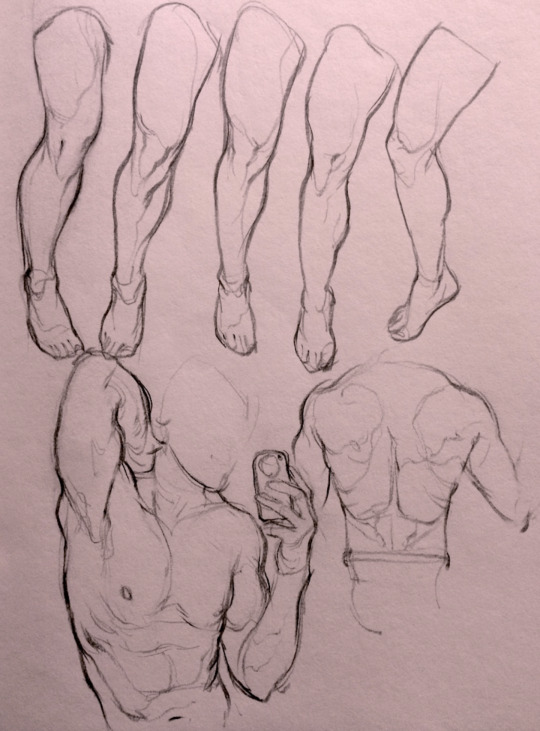

I'd use reference images that I grabbed from fitness forums, Instagram, Tumblr, Pinterest, and some NSFW places, but you could find adequate ref material from figure drawing sites like Line of Action. LoA has refs for people (you can filter by clothed/unclothed, age, & gender), animals, expressions, hands/feet, and a few other useful things as well. Love them.
Learning how to render digitally was a similar story; it helped a lot that I had a pretty strong foundation for value/anatomy going in. I basically didn't touch color at all for ~2 years (except for a few attempts at bad digital or acrylic paint studies), which may not have been the best idea. I learned color from a lot of trial and error, honestly, and I'm pretty sure this process involved a lot of imitation—there were a number of digital/traditional painters whose styles I really wanted to emulate (notably their edge control, color choices, value distributions, and shape design), so I kiiind of did a mixture of that + my own experimentation.
For example, I really found Benjamin Björklund's style appealing, especially his softened/lost edges & vibrant pops of saturated color, so here's a study I did from some photograph that I'm *pretty* sure was painted with him in mind.

Learning how to detail was definitely a slow process, and like all the aforementioned things (anatomy/color/edge control/values/etc.) I'm still figuring it out. Focusing on edge control first (that is, deciding on where to place hard/soft edges for emphasizing/de-emphasizing certain areas of the image) is super useful, because you can honestly fool a viewer into thinking there's more detail in a piece than there actually is if you're very economical about where you place your hard edges.
The most important part, to me, is probably just doing this stuff over and over again. You're likely not going to see improvement in a few weeks or even a few months, so don't fret about not getting the exact results you want and just keep studying + making art. I like to think about learning art as a process where you *need* to fail and make crappy art/studies—there's literally no way around it—so you might as well fail right now. See, by making bad art you're actually moving forward—isn't that a fun prospect!!
It's useful to have a folder with art you admire, especially if you can dissect the pieces and understand why you like them so much. You can study those aspects (like, you can redraw or repaint that person's work) and break down whether this is art that you just like to look at, or if it's the kind of art that you want to *make.* There's a LOT of art out there that I love looking at, probably tens of thousands of styles/mediums, but there's a very narrow range that I want to make myself.
I've mentioned it in some ask reply in the past, but I really do think looking at other artist's work is such a cheat code for improving your own skills—the other artist does the work to filter reality/ideas for you, and this sort of allows you to contact the subject matter more directly. I can think of so many examples where an artist I admired exaggerated, like, the way sunlight rested on a face and created that orange fringe around its edge, or the greys/dull blues in a wheat field, or the bright indigo in a cast shadow, or the red along the outside of a person's eye, and it just clicked for me that this was a very available & observable aspect of reality, which had up until that point gone completely unnoticed! If you're really perceptive about the art you look at, it's shocking how much it can teach you about how to see the world (in this particular case I mean this literally, in that the art I looked at fully changed the way I visually processed the world, but of course it has had a strong effect on my worldviews/relationships/beliefs).
Thanks so much for sending in a question (& for reading, if you got this far)! I read every single ask I receive, including the kind words & compliments, which I genuinely always appreciate. Best of luck with learning, my friend :)

3K notes
·
View notes
Text
just like going through the members of my family and my friend groups one by one, i can't think a single damn person i know who does not have a disability. ARFID. Autism. Metal rod in the spine. Arthritis. Cancer in remission. Long-term effects of repeated concussions. Bad back. Exhaustion. Crohn's. EDS. More Autism and ADHD. Migraines. Periods that lay them out for a week. Chronic depression. Alcoholism. Bipolar. Cataracts.
I do not know a single person who is not disabled, typically in multiple ways, and we all face increased disability as a natural consequence of aging. Literally every person on the planet becomes disabled on a long enough timeline. Yet we still talk about disability and organize around it as if it isn't social, economic, and contextual. people treat disability as an innate quality that some people have and some people do not have, and as if there is some large class of intrinsically abled people who are benefiting under capitalism and are withholding the fruits of their abilities from us or something.
i saw this post on twitter months ago that was like "I need people to understand that if you are in a relationship with a disabled person you are going to have to do more than them. you're not disabled and so you're going to have to do more of the work (around the house, logisticially, etc). that is what you owe them as an abled person."
and it just baffled me. because i have only ever seen disabled people in relationships with other disabled people, caring for one another in a stitched-together, messy web of interdependence and missed deadlines and dirty dishes and acceptance and love, not because disabled people are ontologically more generous than non-disabled people but because non-disabled people don't even actually exist.
the mythological abled person who can work a full time job, keep a clean home, do all the dishes, buy all the groceries, cook all the meals, run all the errands, stay on top of all the bills, carry everything, dash up the stairs, stand on their feet for hours, and have boundless energy without any mental consequences to that does not exist. it's an ideal created to oppress us all. it is an impossible standard the reification of which disables us all.
there is no one on this planet who is not disabled under capitalism and colonialism. there are only people who lack the class consciousness to recognize that they're disabled.
it's gonna have to be us taking care of one another. it's going to be the disabled caring for the disabled. it always will be that. that is the human condition.
3K notes
·
View notes
Text
The local population in countries that export bananas typically eat different varieties grown primarily by small farmers. The ones for the Americans and the Europeans, Cavendish variety bananas, are grown in huge, monoculture plantations that are susceptible to disease. The banana industry consumes more agrichemicals than any other in the world, asides from cotton. Most plantations will spend more on pesticides than on wages. Pesticides are sprayed by plane, 85% of which does not land on the bananas and instead lands on the homes of workers in the surrounding area and seeps into the groundwater. The results are cancers, stillbirths, and dead rivers.
The supermarkets dominate the banana trade and force the price of bananas down. Plantations resolve this issue by intensifying and degrading working conditions. Banana workers will work for up to 14 hours a day in tropical heat, without overtime pay, for 6 days a week. Their wages will not cover their cost of housing, food, and education for their children. On most plantations independent trade unions are, of course, suppressed. Contracts are insecure, or workers are hired through intermediaries, and troublemakers are not invited back.
Who benefits most from this arrangement? The export value of bananas is worth $8bn - the retail value of these bananas is worth $25bn. Here's a breakdown of who gets what from the sale of banana in the EU.
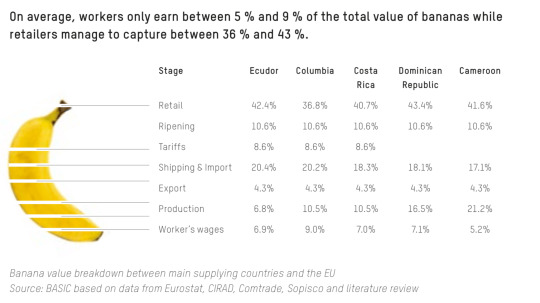
On average, the banana workers get between 5 and 9% of the total value, while the retailers capture between 36 to 43% of the value. So if you got a bunch of bananas at Tesco (the majority of UK bananas come from Costa Rica) for 95p, 6.65p would go to the banana workers, and 38p would go to Tesco.
Furthermore, when it comes to calculating a country's GDP (the total sum of the value of economic activity going on in a country, which is used to measure how rich or poor a country is, how fast its economy is 'growing' and therefore how valuable their currency is on the world market, how valuable its government bonds, its claim on resources internationally…etc), the worker wages, production, export numbers count towards the country producing the banana, while retail, ripening, tariffs, and shipping & import will count towards the importing country. A country like Costa Rica will participate has to participate in this arrangement as it needs ‘hard’ (i.e. Western) currencies in order to import essential commodities on the world market.
So for the example above of a bunch of Costa Rican bananas sold in a UK supermarket, 20.7p will be added to Costa Rica’s GDP while 74.3p will be added to the UK’s GDP. Therefore, the consumption of a banana in the UK will add more to the UK’s wealth than growing it will to Costa Rica’s. The same holds for Bangladeshi t-shirts, iPhones assembled in China, chocolate made with cocoa from Ghana…it’s the heart of how the capitalism of the ‘developed’ economy functions. Never ending consumption to fuel the appearance of wealth, fuelled by the exploitation of both land and people in the global south.
7K notes
·
View notes
Text
One thing I haven't seen a lot of talk about in the fandom so far is about the financials of this season.
It took us two whole months to get a confirmation of renewal from Max, and I talked at the time that I think there was probably a lot of heated negotiations going on at the time with contracts and that's why it took as long as it did.
I think we see a huge number of indications of the compromises that were made in order for S2 to be made. One obvious one that has been talked about is being making in in NZ instead of LA, to save $.
But there's also the eight episodes instead of ten. And then the cast aspect. One downside of moving overseas was having to fly out and house the cast, not just pay day wages.
We knew immediately about Guz Khan not coming back, losing Ivan as a character. At the time I was sad but I thought it had the air of a pretty harshly practical call. If you went through the main recurring cast and said okay which character will affect the fewest things, has the least character interactions of anyone? It would be Ivan. (With the only competition being The Swede IMO, but he's Stede's crew and therefore a little more central.)
And then this season started and we got first The Swede sidelined and taken out of major scenes. And then I noticed that different members of the crew were simply absent for long stretches, like Wee John isn't around for ep 5 at all. And then Buttons takes flight.
Lucius and Pete aren't at the party for most of it. Fang isn't in the torture scene. Roach and Fang aren't in the bar. Etc. SCHEDULING IS HAPPENING.
The new characters are almost entirely played by NZ local actors, which is great, but also...cheaper.
In other words there are big signs that they did everything possible to give us a giant cast of almost everyone we love from S1, and cool new characters, in the most economical way possible.
And I'm grateful for it. I'm grateful we got S2, and it looks great, and it's well written, I'm having a blast, and we get to spend more time with this awesome cast.
But I also kinda think it needs to be said that the cost-cutting shows. That it shouldn't have been only 8 episodes, the pacing is off. That we miss every time someone from the ensemble isn't on screen.
That despite what they've put on screen looking very good, there's far less costuming budget, there's less elaborate sets, and it's a little disappointing. And it's clear it's not a lack of will or talent or vision but blatantly lack of money.
Look, streaming networks want brilliant shows that people love (that will get them to subscribe) but they very don't want to pay anyone to make them. That's like, the whole moment we're having right now.
Max puts out promos about how great it is to not have unions messing shit up in NZ. Well I have friends who are union costumers in LA and guess what union costumers did amazing last season. This season, well, I guess Stede got three whole shirts, so that's cool.
So I dunno. It's just stuff I think about. I'm not trying to be negative about the show in any way. I'm extremely happy with this season; I love it more than well, possibly any show I've ever been in fandom for.
But I see you, Max. You're cheap. You weren't that cheap when you were called HBO.
5K notes
·
View notes